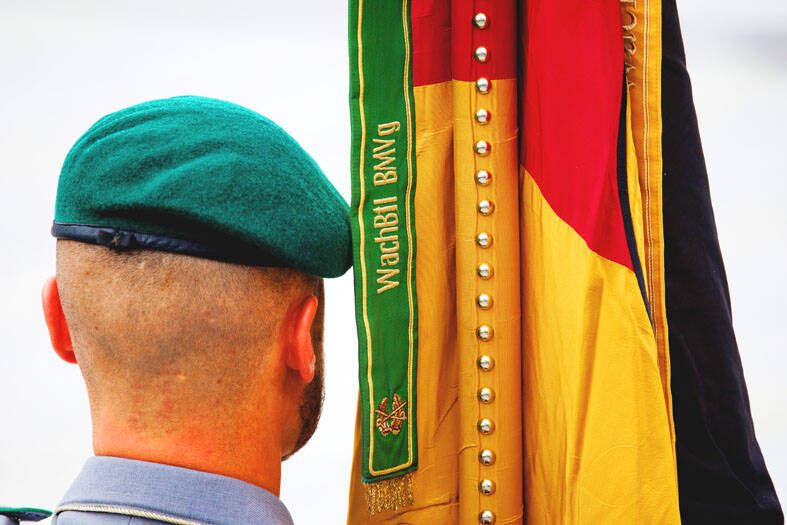Allied talk of sending European peacekeeping forces to protect Ukraine as part of a possible peace deal with Russia has sparked a backlash in Germany, a country still scarred by its militaristic Nazi past, even if the prospect remains remote.
German Chancellor Friedrich Merz has signaled openness to German participation in a possible peacekeeping mission in Ukraine while emphasizing that such a decision would require coordination with European partners and his own coalition.
Any troop deployment would likely require a Bundestag mandate, he said. However, that would be a challenge for a chancellor whose own appointment was only voted through at the second attempt.

Photo: EPA
Russia is fiercely opposed to any troops from the NATO alliance being deployed and it is far from clear how such a force could work.
Alternative for Germany (AfD) head Alice Weidel accused Merz’s conservatives of war-mongering for even considering the idea of ground troops, slamming it as “dangerous and irresponsible.”
Even German Minister for Foreign Affairs Johann Wadephul warned sending troops to Ukraine “would probably overwhelm us.”
There is unease in Germany over troop deployments, given its Nazi past, and more recent deployments to Afghanistan and Mali that were widely seen as failures. There is also a backlash against spending billions of euros on military aid for Ukraine when Germany’s own economy is struggling.
Policymakers are also nervous about overstretching Germany’s long-neglected army and being sucked into a direct confrontation with a nuclear power.
“Something like this is obviously extremely controversial in Germany,” Institute for Security Policy at Kiel University non-resident fellow Marcel Dirsus said, adding that the government would tread very carefully.
“There is no point expending political capital on something that might not actually come to pass,” he said.
French President Emmanuel Macron and British Prime Minister Keir Starmer have spoken in favor of troop deployments in a post-war settlement, but Germans are more wary of the idea.
A Forsa survey found that 49 percent of Germans would support Germany sending its own soldiers to a European peacekeeping force, but 45 percent oppose it — compared with much stronger majorities in favor in the UK and France.
Skepticism is particularly strong in east Germany, where three states hold elections next year.
Christian Democratic Union (CDU) leader Sven Schulze said the Bundeswehr, or the German armed forces, was barely in a position to deploy troops.
It was much more important to build “a strong European security architecture,” he said. “Anything else would overwhelm us as a country and also the Bundeswehr.”
Skepticism is even greater within the Social Democratic Party of Germany (SPD), who have traditionally argued more in favor of engagement with Russia.
“Germany should stay out of this matter,” SPD lawmaker Ralf Stegner said. “The deployment of German soldiers in the region is also extremely difficult for historical reasons.
For some, including CDU parliamentary defense committee head Thomas Roewekamp, German troops would be needed in the event of a permanent ceasefire between Russia and Ukraine.
“And to make deterrence credible, we must have military capabilities,” he said.

Auschwitz survivor Eva Schloss, the stepsister of teenage diarist Anne Frank and a tireless educator about the horrors of the Holocaust, has died. She was 96. The Anne Frank Trust UK, of which Schloss was honorary president, said she died on Saturday in London, where she lived. Britain’s King Charles III said he was “privileged and proud” to have known Schloss, who cofounded the charitable trust to help young people challenge prejudice. “The horrors that she endured as a young woman are impossible to comprehend and yet she devoted the rest of her life to overcoming hatred and prejudice, promoting kindness, courage, understanding

‘DISRESPECTFUL’: Katie Miller, the wife of Trump’s most influential adviser, drew ire by posting an image of Greenland in the colors of the US flag, captioning it ‘SOON’ US President Donald Trump on Sunday doubled down on his claim that Greenland should become part of the US, despite calls by the Danish prime minister to stop “threatening” the territory. Washington’s military intervention in Venezuela has reignited fears for Greenland, which Trump has repeatedly said he wants to annex, given its strategic location in the arctic. While aboard Air Force One en route to Washington, Trump reiterated the goal. “We need Greenland from the standpoint of national security, and Denmark is not going to be able to do it,” he said in response to a reporter’s question. “We’ll worry about Greenland in

PERILOUS JOURNEY: Over just a matter of days last month, about 1,600 Afghans who were at risk of perishing due to the cold weather were rescued in the mountains Habibullah set off from his home in western Afghanistan determined to find work in Iran, only for the 15-year-old to freeze to death while walking across the mountainous frontier. “He was forced to go, to bring food for the family,” his mother, Mah Jan, said at her mud home in Ghunjan village. “We have no food to eat, we have no clothes to wear. The house in which I live has no electricity, no water. I have no proper window, nothing to burn for heating,” she added, clutching a photograph of her son. Habibullah was one of at least 18 migrants who died

Russia early yesterday bombarded Ukraine, killing two people in the Kyiv region, authorities said on the eve of a diplomatic summit in France. A nationwide siren was issued just after midnight, while Ukraine’s military said air defenses were operating in several places. In the capital, a private medical facility caught fire as a result of the Russian strikes, killing one person and wounding three others, the State Emergency Service of Kyiv said. It released images of rescuers removing people on stretchers from a gutted building. Another pre-dawn attack on the neighboring city of Fastiv killed one man in his 70s, Kyiv Governor Mykola